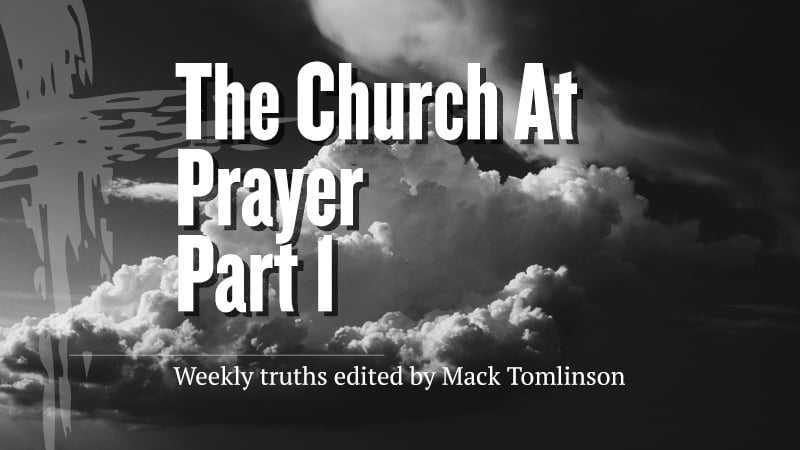
Then returned they unto Jerusalem from the mount called Olivet . . . And when they were come in, they went up into an upper room, where abode both Peter and James and John and Andrew, Philip and Thomas, Bartholomew and Matthew, James the son of Alphaeus and Simon Zelotes, and Judas the brother of James. These all continued with one accord in prayer and supplication, with the women, and Mary the mother of Jesus, and with his brethren’ (Acts 1:12-14).
1. THE TIME
These verses tell of the disciples at prayer after the ascension of our Lord. In the ten days which intervened before Pentecost they ‘continued steadfastly in prayer’. Their prayer-meetings lay in between great events. They were preceded by our Lord’s ministry and passion and resurrection and his appearances and his promise of the Spirit and his mapping out of the missionary program- ‘unto the uttermost part of the earth.’ They were followed by Pentecost and the wonderful progress in carrying out that missionary program in the Acts of the Apostles.
What an important period this was! No three-year period in all history can compare with the period of our Lord’s ministry culminating in his ascension on high, and no period in church history excels the half-century of apostolic labors which followed. And these ten days of steadfast prayer before Pentecost had an importance of their own.
2. THE PLACE
On coming from the mount of Olives, the disciples went up into an upper room where they were lodging. Theodore Zahn and others take it to be the same room in which they had celebrated the Supper. It has also been suggested that it belonged to Mary, the mother of John Mark. All that is certain is that it was an upper room in Jerusalem, the city which had slain the prophets and had recently crucified the Lord.
These men and women displayed a considerable amount of courage in meeting there in those days. It reminds one of the boldness of the Huguenots in 1559. Though the king, Henry II, had set his heart on their extermination, they held a Synod in Paris under the very shadow of his throne and drew up a confession of faith and a form of church order. When Henry heard the news of their daring, he vowed that he would punish these ‘rebels’, but shortly after, he was accidentally wounded in the eye by a lance at a joust and died from his wound.
Those who gathered for prayer in Jerusalem in those ten days no doubt concluded that the Lord meant them to be so occupied when he charged them ‘not to depart’ from that city and ‘to wait for the promise of the Father’ (vs. 4). In doing his will, they counted upon his protection.
3. THE PEOPLE PRESENT
It was a small congregation. There were the eleven apostles. Some weeks before, all of them had forsaken their Lord and fled. Peter had denied his Lord with oaths and curses, and Thomas had shown obstinate unbelief. But the risen Lord had met with them and dealt graciously with them, pardoning and restoring them.
In the praying band there were ‘the women.’ Among them would be some, if not all, of those who followed him and ministered to him and his disciples of their substance and those who watched at the cross. In all probability Mary Magdalene, Mary the mother of James and Joses, Joanna, Salome, and Susanna would have been present.
With them also was Mary the mother of Jesus. A sword had pierced her soul but now her wound was healed and without doubt the song of the Magnificat welled up in her heart more than ever.
Roman Catholic writers have not been slow to point out that Peter’s name appears first in the lists of the apostles and they use this as proof of their view of his primacy. It may be pointed out in reply that Mary appears near the close of the list (v. 14). Indeed she and her sons are at the very end. If then we are to argue from the order of the names, there would be a strong case against the position Vatican II assigns to her as Queen of the universe and mediatrix! Mary had her glories, but she laid them down at her Redeemer’s feet; she had her glories, but they are not such as have often been assigned to her.
Then we find the Lord’s ‘brethren’ listed as present; they had been unbelieving, but now they share the faith of the disciples in the risen Lord and keep the appointed times of prayer with them.
It had looked as if the cause was lost when the disciples forsook the Lord in Gethsemane and fled. Peter was severely sifted in Satan’s sieve and no doubt the others were sorely tried also, but now they have been delivered from the ravening mouth of the lion. Their Lord had assured them that it was the will of the Father that ‘of all given to the Son he should lose nothing.’ True, there were only eleven. Their names are listed in pairs and the last one — Judas the brother of James — has no companion. But the Lord was well aware that this would happen. He had said: ‘one of you is a devil’ (John 6:70). And in his great high-priestly prayer he said: ‘None of them is lost but the son of perdition, that the scripture might be fulfilled.’ Moreover, in this very chapter (Acts 1), Judas the brother of James gets a companion when the gap is filled by the appointment of Matthias.
So we see the little congregation gathered under the protecting hand of the sovereign, all-controlling God whose purposes can know no defeat. The over-ruling hand of the Almighty is evident everywhere in the Acts of the apostles. Paul and Barnabas were cast out of Antioch of Pisidia, but ‘as many as were ordained to eternal life believed’ (Acts 13:48). Paul was in some danger and possessed by certain fears when he came to the wicked city of Corinth, but the Lord said to him in a vision by night: ‘Be not afraid, but speak and hold not thy peace, for I am with thee and no man shall lay hands on thee to hurt thee; for I have much people in this city’ (Acts 18:9-10). So God assured his servants of protection and abundant fruit. And this same God is our God today.
to be continued
– W. J. Grier
